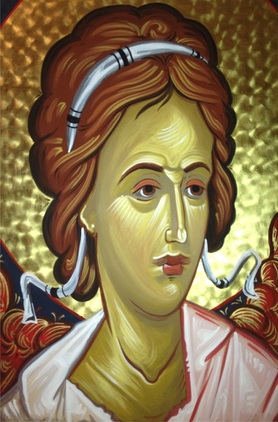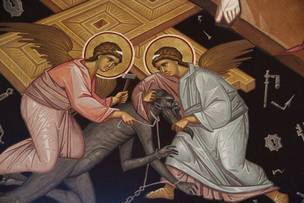Marriage
|
Premarital
|
Modern psychiatry seeks to establish a stronghold and to out flank intellectually all metaphysical presuppositions and understanding regarding cause and effect as preeminent while denying the deeper meaning of cause and purpose. While improving “the perceived quality” of someone’s life may be a given for the secular counselor it has not been the intention for my clinical practice which based on deeper more pressing concerns dealing with the complexity of the person and not simply superficial comforts.
By identifying what you value you will prioritize more effectively and will experience true joy and inner peace. Augment your skill set and your support system. Move through your fear and learn more effective problem solving techniques. With each success your confidence and momentum will build.
Life is replete with struggle, obstacles and even suffering. Disappointment and uncertainty bear an identifiable anguish that if left to grow will erode hope and confidence that a resolution is at hand.
As a practicing Orthodox Psychotherapist the spiritual informs my assessment which best lends itself to a comprehensive and unified understanding of the person. It validates the human experience and the great frontier of the personal development. It is not about the appropriation of madness but about the healing of the person.
Psychiatry has yet to agree on the most fundamental 'truths' of the field. Each school seems to hold contradictory positions on ontological causes and treatments for the mentally ill. They have all willing accepted discussing the condition in medical terms referring to behavioral clusters, mood instability and cognitive distortions as symptoms indicative of an illness in a patient. They tend to be more focused on treating the illness then the person.
My therapeutic approach never sees the individual as willfully complicit in their condition but rather I have a comprehensive understanding of the person and appreciate how mental conditions may have biological origins, environmental and circumstantial causes and existential underpinnings. This complex understanding of the human being postulated is not reductionistic as psychiatry and therefore is not needlessly one sided.
The Orthodox phronima worldview does not seek to place blame and the afflicted person. Psychotherapy is focused on the journey and purpose of the person and not with merely masking or mitigating the individual’s unwanted circumstance. It is about how we face and confront limitations and short comings that we find our peace. I perceive before me the person who has a body, soul (psyche) and spirit (mind).
About the work
When it comes to ideology, my clinical focus and psychotherapeutic methodology is concerned that I have the freedom to carry out my mission, to be a catalyst for healing. Therefore it is imperative that insurance mandates and bureaucratic panels do not drive treatment. For this reason I do accept insurance. I value the opportunity to work within a paradigm of wellness where total privacy is afforded.
Mindful of the human condition, Licensed Psychotherapist Angela Damianakis of OrthoPraxis Counseling, Inc. employs a more user friendly holistic approach which lends itself to a more fulfilled existence because it embraces the totality of the person. Orthopraxis Counseling liberates both the practitioner and the participant from the modern mechanistic interpretation of the human condition with its pathology based underpinnings and trappings. It is a more respectable approach to suffering demonstrating how spirituality transcends the materialists one sided endless questioning of 'patients' as if deciphering a code of what professionals have determined to be logical constants. Orthodox Christians are interested in asking the larger questions of purpose which defers the natural inclination to shore up one's defenses to avert blame and guilt.
Existiential (Neptic) psychotherapy and scientifically based treatment modalities are intergrated. OrthoPraxis Counseling is distinguished as the authoritative therapeutic method dispelling worldly illusions about exlusively secular therapy reflecting the perfect synergy between correct practice and wellness. Orthopraxis Counseling is the forum and gateway for meaningful inquiries and substantive dialogue encouraging clients and workshop participants to consider the therapeutic method of healing contained within Existential (Neptic) Psychotherapy.
The primary distinction between Orthopraxis Counseling and exclusively secular therapies is based on how Licensed Psychotherapist Angela Damianakis is concerned with what is central to the mystery of human being. It very much is about perspective and is central to healing; as this distinction directly affects methodology. This understanding was undeniably the most crucial element in Angela’s clinical practice and the defining moment in her professional career.
Psychotherapist Angela explains “When approaching treatment my approach is by necessity client-centered in the truest most meaningful way. With the utmost respect I understand that simply because I have met with someone I do not presume to know them in the fullest sense; this is the mystery of the person as symptoms and problems are not to be confused with personhood”.
It is both practical and compassionate to begin where the individuals actually are and rouse their spirit to understand their mental depression and spiritual malaise. In my role as a psychotherapist I am often poised to explore with clients a more nuanced psychotherapy where the individual is made aware of ontological causes for their decline. This existential approach begins to build the foundation and ultimately a framework which is more effective and adaptive in dealing with the complexity and dignity of the person. Existential psychotherapy does more then address preliminary exploration regarding health and wellness it is more central to the individual, it deals directly with identity. It determines how the individual perceives one’s place in the world how to relate with fellow man and all of creation. Science with its crude reductionism can never answer these more central questions of personhood and this is the challenge for my clinical work.
As an Orthodox practitioner I established Orthopraxis Counseling to provide the most conducive space to assist clients in their journey of restoration and self-discovery. Of course as a Licensed Psychotherapist and clinician I provide treatment for the mind which is scientifically informed.
The universality of brokenness is our human condition. It is in weakness and through failings that one finds purpose and is made useful. The struggle is one’s credential and authority. We cannot deny our brokenness and hope to be helpful to our neighbor. We are not merely generally fallen we are individually imperfect. As human beings we all bear the hand print of God and there is a dignity and stature which is granted us but we all also should be humbly kneeling in the recess of our heart. It is important not to alienate ourselves from our pain with denial, minimization or rationalization. One cannot hope to be whole if we do not embrace our brokenness as a treasure and gift to offer to one another as unvarnished truth and testimony of our authenticity. Each of us has weathered storms which enables us to see one another as our neighbor and not someone alien to ourselves or foreign to our experience. During the course of a career in counseling there is a reoccurring question which arises in the mind of the client “How do you help?” Treatment begins when such prejudices of “otherness” is challenged. Our shared humanity is the bridge in healing and a sign that assistance is really on the horizon.
My function as a psychotherapist is to respectfully defer all judgment about the cosmology of the condition and defer all certitude about the great enigma that is the person. No matter how well I know a person or a diagnosis (condition) inherent in each session there is an opportunity for learning and not assuming to know too much. It comes from the respect for the unknowable about the person before. What drives someone into counseling: the unmanageably of his/her life is not synonymous with the personhood. It is the intersection between two individuals who are willing to encounter and explore the hidden or less familiar terrain of the mind-body-soul. In my case I assume the posture of guide but very often clients guide me to the untended or cultivated parts of myself. There is always the 'apophatic mystery' of the person which cannot be presumed or devalued. It is my willingness to be affected by the other person by the same measure and to the same degree that each client is undertaking.
By identifying what you value you will prioritize more effectively and will experience true joy and inner peace. Augment your skill set and your support system. Move through your fear and learn more effective problem solving techniques. With each success your confidence and momentum will build.
Life is replete with struggle, obstacles and even suffering. Disappointment and uncertainty bear an identifiable anguish that if left to grow will erode hope and confidence that a resolution is at hand.
As a practicing Orthodox Psychotherapist the spiritual informs my assessment which best lends itself to a comprehensive and unified understanding of the person. It validates the human experience and the great frontier of the personal development. It is not about the appropriation of madness but about the healing of the person.
Psychiatry has yet to agree on the most fundamental 'truths' of the field. Each school seems to hold contradictory positions on ontological causes and treatments for the mentally ill. They have all willing accepted discussing the condition in medical terms referring to behavioral clusters, mood instability and cognitive distortions as symptoms indicative of an illness in a patient. They tend to be more focused on treating the illness then the person.
My therapeutic approach never sees the individual as willfully complicit in their condition but rather I have a comprehensive understanding of the person and appreciate how mental conditions may have biological origins, environmental and circumstantial causes and existential underpinnings. This complex understanding of the human being postulated is not reductionistic as psychiatry and therefore is not needlessly one sided.
The Orthodox phronima worldview does not seek to place blame and the afflicted person. Psychotherapy is focused on the journey and purpose of the person and not with merely masking or mitigating the individual’s unwanted circumstance. It is about how we face and confront limitations and short comings that we find our peace. I perceive before me the person who has a body, soul (psyche) and spirit (mind).
About the work
When it comes to ideology, my clinical focus and psychotherapeutic methodology is concerned that I have the freedom to carry out my mission, to be a catalyst for healing. Therefore it is imperative that insurance mandates and bureaucratic panels do not drive treatment. For this reason I do accept insurance. I value the opportunity to work within a paradigm of wellness where total privacy is afforded.
Mindful of the human condition, Licensed Psychotherapist Angela Damianakis of OrthoPraxis Counseling, Inc. employs a more user friendly holistic approach which lends itself to a more fulfilled existence because it embraces the totality of the person. Orthopraxis Counseling liberates both the practitioner and the participant from the modern mechanistic interpretation of the human condition with its pathology based underpinnings and trappings. It is a more respectable approach to suffering demonstrating how spirituality transcends the materialists one sided endless questioning of 'patients' as if deciphering a code of what professionals have determined to be logical constants. Orthodox Christians are interested in asking the larger questions of purpose which defers the natural inclination to shore up one's defenses to avert blame and guilt.
Existiential (Neptic) psychotherapy and scientifically based treatment modalities are intergrated. OrthoPraxis Counseling is distinguished as the authoritative therapeutic method dispelling worldly illusions about exlusively secular therapy reflecting the perfect synergy between correct practice and wellness. Orthopraxis Counseling is the forum and gateway for meaningful inquiries and substantive dialogue encouraging clients and workshop participants to consider the therapeutic method of healing contained within Existential (Neptic) Psychotherapy.
The primary distinction between Orthopraxis Counseling and exclusively secular therapies is based on how Licensed Psychotherapist Angela Damianakis is concerned with what is central to the mystery of human being. It very much is about perspective and is central to healing; as this distinction directly affects methodology. This understanding was undeniably the most crucial element in Angela’s clinical practice and the defining moment in her professional career.
Psychotherapist Angela explains “When approaching treatment my approach is by necessity client-centered in the truest most meaningful way. With the utmost respect I understand that simply because I have met with someone I do not presume to know them in the fullest sense; this is the mystery of the person as symptoms and problems are not to be confused with personhood”.
It is both practical and compassionate to begin where the individuals actually are and rouse their spirit to understand their mental depression and spiritual malaise. In my role as a psychotherapist I am often poised to explore with clients a more nuanced psychotherapy where the individual is made aware of ontological causes for their decline. This existential approach begins to build the foundation and ultimately a framework which is more effective and adaptive in dealing with the complexity and dignity of the person. Existential psychotherapy does more then address preliminary exploration regarding health and wellness it is more central to the individual, it deals directly with identity. It determines how the individual perceives one’s place in the world how to relate with fellow man and all of creation. Science with its crude reductionism can never answer these more central questions of personhood and this is the challenge for my clinical work.
As an Orthodox practitioner I established Orthopraxis Counseling to provide the most conducive space to assist clients in their journey of restoration and self-discovery. Of course as a Licensed Psychotherapist and clinician I provide treatment for the mind which is scientifically informed.
The universality of brokenness is our human condition. It is in weakness and through failings that one finds purpose and is made useful. The struggle is one’s credential and authority. We cannot deny our brokenness and hope to be helpful to our neighbor. We are not merely generally fallen we are individually imperfect. As human beings we all bear the hand print of God and there is a dignity and stature which is granted us but we all also should be humbly kneeling in the recess of our heart. It is important not to alienate ourselves from our pain with denial, minimization or rationalization. One cannot hope to be whole if we do not embrace our brokenness as a treasure and gift to offer to one another as unvarnished truth and testimony of our authenticity. Each of us has weathered storms which enables us to see one another as our neighbor and not someone alien to ourselves or foreign to our experience. During the course of a career in counseling there is a reoccurring question which arises in the mind of the client “How do you help?” Treatment begins when such prejudices of “otherness” is challenged. Our shared humanity is the bridge in healing and a sign that assistance is really on the horizon.
My function as a psychotherapist is to respectfully defer all judgment about the cosmology of the condition and defer all certitude about the great enigma that is the person. No matter how well I know a person or a diagnosis (condition) inherent in each session there is an opportunity for learning and not assuming to know too much. It comes from the respect for the unknowable about the person before. What drives someone into counseling: the unmanageably of his/her life is not synonymous with the personhood. It is the intersection between two individuals who are willing to encounter and explore the hidden or less familiar terrain of the mind-body-soul. In my case I assume the posture of guide but very often clients guide me to the untended or cultivated parts of myself. There is always the 'apophatic mystery' of the person which cannot be presumed or devalued. It is my willingness to be affected by the other person by the same measure and to the same degree that each client is undertaking.

As people we all need to be connected and have a sense of belonging. Too frequently we experience isolation and a domineering fractured state of being. This overwhelming feeling of loneliness and being disconnected is driven by the human crisis resulting from existential realities. Life without purpose is meaningless and the inevitability of pain unbearable. Living can seem like we are just marking time until death when we seem trapped by all of the things which go with being human being are in your face all the time with great force. Experience has taught me that the human condition brings that sense of fear and alienation to every one of us at least some of the time.
There is a stream of consciousness and thoughts which are present in each of us. Neptic teachings as a vehicle for existential or transpersonal psychotherapy has something to tell the world about the inner workings of the person. If you are wake at two o’clock in the morning we find that our thoughts cover the same ground we are not that different from each other the thoughts are almost always painful or full of desire. Left unchecked the mind can lead us to personal hell because this neurosis of the mind does not know where to stop. If we listen to these thoughts with any intent then we fill ourselves up with depression. It is a natural state to live in depression if we listen to our own stream of consciousness. The stream of thoughts is differentiated from the active use of our mind. When thinking in this way we are actually working in concert with our design and this co-creative mode has a very noble quality. This is not of the same emotional or cognitive reality as those thoughts which are heard mostly late at night which drive one to despair. The hesycast (stillness) philosophy and the nepsis (watchfulness) methodology teaching that everything that is wrong with us begins and starts with these thoughts which are constantly emanating within our mind.
For Christians it arises from our inner brokenness and it is experienced as the misbehavior of our first parent Adam and Eve. In the west they commonly see a story of sin, punishment and exile. In the eastern church and philosophy there is the understanding of something more tragic then that; something which was beautiful and which was lost. By the time the story is over bad things have happened the immediate intimacy between God and his creation has disappeared. For non-believers this still can serve as the mythology stands on its own merit. The fall denotes how we have lost as a race that joyful open intimacy and the synergy of the person mind, body and spirit. The heavenly realm seems quite far away from us. It does not mean that God is less present it means that we are less present. Mindfulness treatment takes note of the most tragic fundamental break and the foreboding fracture within the deep humanity that being the gap between the head and the heart. There is this challenging sadness of the heart who is essentially oppressed by the mind with its intrusive thoughts which seek to control and tries to supplant by identifying itself as the totality of the person while the heart meanwhile lays quiet and covered. We are covered with debris which the action of prayer and active love over time eventually it gives his the ability to wake our consciousness and reflect profound love. Within the heart and the Nous center of the organ of our soul seeks God to find our purpose. Get out of your head and get into your hearts. Otherwise God seems far from you. Leave the thoughts behind. It takes effort but eventually there will be a spiritual sweetness. The mind will try and set you on a different path entirely. At the beginning the thought is very small and we can afford to ignore it but then it becomes more important and we pay attention to it and then we enjoy it but then the thought becomes more important than other things and then it is all we can think about that is depression and anxiety. Psychology per say as such it is not a bad thing. It is a good thing for many people giving them the ability to solve problems quickly over a short amount of time but it does not allow them flower. A very great deal can be achieved by being presently mindful. Listen and be present instead of trying to remember everything. Despair and depression must be dealt with in spiritual means. If we conceive of God and work around that principle then we learn to get better.
OrthoPraxis Counseling provides the framework, and the session the arena, where clients have the chance to tell their story, to share why they are as they and how they got where they are. In truth as we gather together we are approached by love which heals that gap by sharing the light in each other. Too often going to church was entangled with a brimming over of tension and religion. In the world of clinical psychology or psychiatry it is more about a particular group of practioners which have a group of specific interests and agendas. I have a special interest in individuals in the common good of healing the crisis which arrives from existential concerns.
There is a stream of consciousness and thoughts which are present in each of us. Neptic teachings as a vehicle for existential or transpersonal psychotherapy has something to tell the world about the inner workings of the person. If you are wake at two o’clock in the morning we find that our thoughts cover the same ground we are not that different from each other the thoughts are almost always painful or full of desire. Left unchecked the mind can lead us to personal hell because this neurosis of the mind does not know where to stop. If we listen to these thoughts with any intent then we fill ourselves up with depression. It is a natural state to live in depression if we listen to our own stream of consciousness. The stream of thoughts is differentiated from the active use of our mind. When thinking in this way we are actually working in concert with our design and this co-creative mode has a very noble quality. This is not of the same emotional or cognitive reality as those thoughts which are heard mostly late at night which drive one to despair. The hesycast (stillness) philosophy and the nepsis (watchfulness) methodology teaching that everything that is wrong with us begins and starts with these thoughts which are constantly emanating within our mind.
For Christians it arises from our inner brokenness and it is experienced as the misbehavior of our first parent Adam and Eve. In the west they commonly see a story of sin, punishment and exile. In the eastern church and philosophy there is the understanding of something more tragic then that; something which was beautiful and which was lost. By the time the story is over bad things have happened the immediate intimacy between God and his creation has disappeared. For non-believers this still can serve as the mythology stands on its own merit. The fall denotes how we have lost as a race that joyful open intimacy and the synergy of the person mind, body and spirit. The heavenly realm seems quite far away from us. It does not mean that God is less present it means that we are less present. Mindfulness treatment takes note of the most tragic fundamental break and the foreboding fracture within the deep humanity that being the gap between the head and the heart. There is this challenging sadness of the heart who is essentially oppressed by the mind with its intrusive thoughts which seek to control and tries to supplant by identifying itself as the totality of the person while the heart meanwhile lays quiet and covered. We are covered with debris which the action of prayer and active love over time eventually it gives his the ability to wake our consciousness and reflect profound love. Within the heart and the Nous center of the organ of our soul seeks God to find our purpose. Get out of your head and get into your hearts. Otherwise God seems far from you. Leave the thoughts behind. It takes effort but eventually there will be a spiritual sweetness. The mind will try and set you on a different path entirely. At the beginning the thought is very small and we can afford to ignore it but then it becomes more important and we pay attention to it and then we enjoy it but then the thought becomes more important than other things and then it is all we can think about that is depression and anxiety. Psychology per say as such it is not a bad thing. It is a good thing for many people giving them the ability to solve problems quickly over a short amount of time but it does not allow them flower. A very great deal can be achieved by being presently mindful. Listen and be present instead of trying to remember everything. Despair and depression must be dealt with in spiritual means. If we conceive of God and work around that principle then we learn to get better.
OrthoPraxis Counseling provides the framework, and the session the arena, where clients have the chance to tell their story, to share why they are as they and how they got where they are. In truth as we gather together we are approached by love which heals that gap by sharing the light in each other. Too often going to church was entangled with a brimming over of tension and religion. In the world of clinical psychology or psychiatry it is more about a particular group of practioners which have a group of specific interests and agendas. I have a special interest in individuals in the common good of healing the crisis which arrives from existential concerns.




